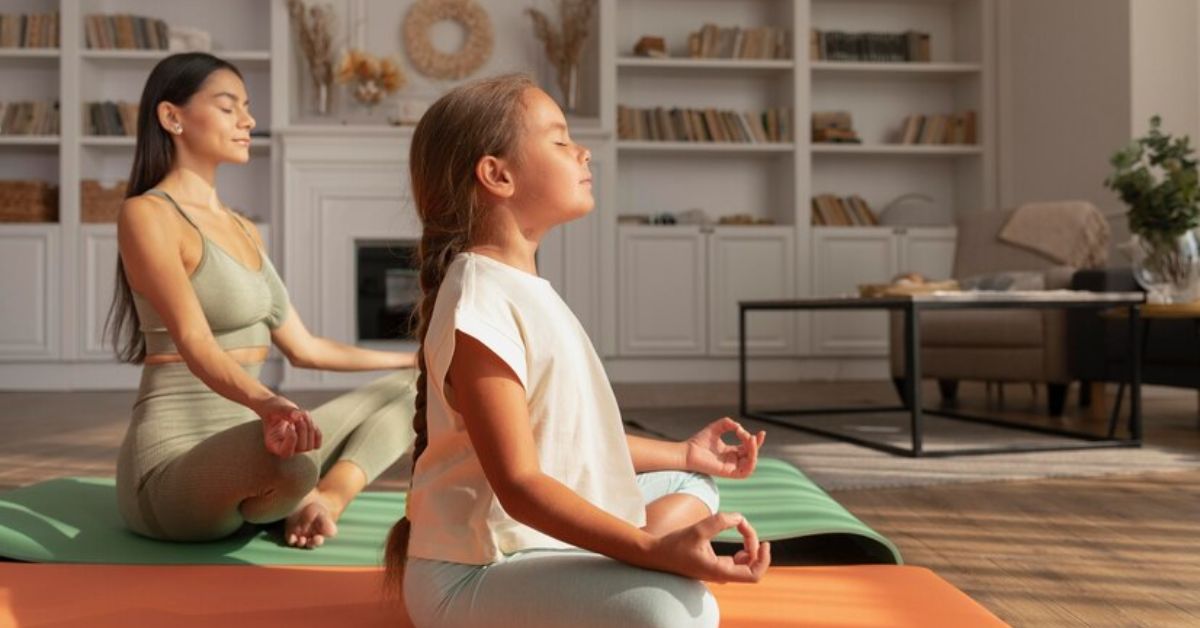Are you feeling overwhelmed, anxious, or emotionally drained? Life’s struggles often lead us to seek respite, and yoga and meditation may be the solution you need. Rooted in ancient traditions, these practices provide highly effective tools for maintaining mental well-being in today’s hectic world.
Relieving Stress by Gentle Movement
Mindful yoga stretches and postures help alleviate physical tension. The slow, deliberate movements focus on deep breathing and staying present, fostering a sense of calm and allowing one to step back from stressors.
Combining physical activity with mental awareness, yoga activates the parasympathetic nervous system, reducing cortisol levels and promoting relaxation. It can complement depression treatment for teens by fostering resilience and improving stress management, creating a buffer against life’s challenges. However, this effect extends beyond the mat.
You may find yourself calmer during difficult conversations or more composed in hectic environments. Yoga becomes an ability to achieve inner peace.
Improving Emotional Equilibrium
Mindfulness is the foundation of emotional regulation. Yoga and meditation enhance this by focusing on mindfulness. You begin to watch your thoughts and feelings rather than judging them so you can respond thoughtfully, not impulsively.
Yoga classes often include pranayama, which is a powerful breathing technique that promotes emotional stability. By regulating the nervous system, controlled breathing helps manage intense emotions such as anger and fear. Meditation also promotes emotional balance and fosters gratitude.
These disciplines work overtime to further weaken symptoms of depression and anxiety, allowing for better and more stable emotional baselines.
Focus and Clarify
Mental fog and distractions can disrupt daily life. Meditation trains the mind to focus better. Focusing on the breath, a mantra, or a single thought strengthens concentration.
Yoga supports this by teaching body awareness. Alignment-based poses demand focus and precision, enhancing body awareness.
Together, yoga and meditation sharpen mental clarity. This can improve productivity and decision-making in personal and professional settings. You may find it easier to tackle tasks with confidence and focus after incorporating these practices into your routine.
Improving Better Sleep
Stress and mental pressure often lead to sleeplessness and restless nights. Yoga and meditation bring about natural improvement in sleep, such as evening yoga sessions with Child’s Pose or Legs-Up-The-Wall that help the mind settle down and prepare the body for sleep.
Meditation focuses on relaxation, which can let loose fears that keep us awake night after night. Guided meditations focused on sleep are also highly effective. These practices quiet racing thoughts, promoting deeper and more restful sleep. Additionally, a kava shot before meditation can enhance the calming effects, helping to soothe anxiety and further aid in relaxation. Sleep improves mental health conditions for better conditions and so forth, creating a positive kind of renewal.
Learn Self-Compassion
Negative self-talk contributes to many mental health challenges. You learn a better, kinder way to get along with yourself in yoga and meditation. The non-competitive nature of these practices encourages you to honor your body and its limitations.
Practices like loving-kindness meditation foster compassion, forgiveness, and empathy, replacing self-criticism with self-acceptance. As your mind will tend to become more compassionate so will the relationships between you and other people improve.
Building Resilience Over Time
A consistent yoga and meditation practice builds resilience over time. Such practices encourage patience and flexibility. Life’s ups and downs become less overwhelming as you develop the tools to navigate them with grace.
The physical strength gained through yoga complements the mental fortitude developed in meditation. Taken as a whole, this gives one a holistic view of handling challenges. The end is not about sidestepping problems but rising against them with confidence and a sense of calmness.
Connecting Mind, Body, and Spirit
Among the many benefits of yoga and meditation is that they can harmonize mind, body, and spirit. This will lead to a deep feeling of harmony and wholeness. The focus on movement and breath in yoga links physical health to emotional and mental well-being.
Meditation takes it further by exploring inner awareness. Over a few weeks of continuous practice, you may begin feeling a sense of direction and alignment. This approach not only supports mental health but overall life satisfaction.
Getting Started
Yoga or meditation practice does not require much equipment or experience. Simple practices can be done at home or in a group setting. Many online resources and apps provide guided sessions tailored to different needs and skill levels.
Start small, as just a few minutes a day can make a significant difference. As you get accustomed to these practices, you can gradually increase the time spent. Consistency is key in that benefits grow with regular engagement.
Conclusion
Yoga and meditation provide profound mental health benefits. They reduce stress, enhance focus, and promote emotional balance. These practices support better sleep, encourage self-compassion, and build resilience.
By harmonizing the mind, body, and spirit, these practices promote a holistic sense of well-being. Whether you’re a seasoned practitioner or a curious beginner, embracing yoga and meditation could be a transformative step toward a healthier, more balanced life.











